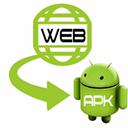Top Web2App Alternatives for Creating Desktop Apps from Websites
Web2App is a handy tool that allows you to transform your favorite websites and internet services into dedicated desktop applications, complete with their own dock or menu bar icons. It's designed to streamline your workflow by moving frequently used web services like email, social media, or document editors out of your crowded browser tabs and onto your desktop. However, if you're looking for a Web2App alternative with different features, pricing, or platform compatibility, there are several excellent options available.
Best Web2App Alternatives
Whether you're seeking a free, open-source solution, cross-platform compatibility, or specific integration features, these alternatives offer various ways to bring your web services to the desktop.

GNOME Web
GNOME Web is a web browser for the GNOME desktop, leveraging the WebKit engine. It's a fantastic open-source and free alternative for Linux and BSD users, offering a clean browsing experience. Its standout features, like a built-in ad-blocker, integrated PDF viewer, and the ability to place websites on your desktop, make it a strong contender for those who appreciate lightweight and integrated solutions.

Fluid
Fluid is a Freemium Mac-specific application that excels at creating Site-Specific Browsers (SSBs) for your favorite web apps. If you frequently use services like Gmail, Facebook, or Pandora and want them as standalone applications on your Mac, Fluid is an excellent Web2App alternative, offering a dedicated desktop experience for your web services.

WebCatalog
WebCatalog is a versatile Freemium and open-source Web2App alternative available across Mac, Windows, and Linux. It allows you to transform any web app into a desktop app with enhanced features like browser protection, cross-browser support, multiple profiles, and separated workspaces. Its cross-platform nature and robust feature set make it a powerful choice for users seeking comprehensive desktop integration for their web services.

Web2Desk
Web2Desk is a free and straightforward tool to convert websites into desktop apps with just one click. It supports Mac, Windows, and Linux, making it a truly cross-platform Web2App alternative. Its simplicity and focus on quick conversion make it ideal for users who prioritize ease of use.

Applicationize
Applicationize is a free and open-source web-based service that seamlessly converts web apps into desktop apps, primarily designed for Chrome OS. If you're looking for a quick, browser-based solution that integrates well with the Chrome ecosystem, Applicationize is a viable Web2App alternative.

Pokki
Pokki is a free Windows-only program launcher that places web-connected apps directly in your taskbar. While more of a launcher than a dedicated app creator, it serves as a Web2App alternative for Windows users who want quick access to their favorite web services from a familiar desktop interface.

Website 2 APK Builder
Website 2 APK Builder is a Freemium Windows application designed to convert HTML, CSS, and JavaScript web content into Android apps. While not directly creating desktop apps like Web2App, it's a relevant alternative for developers or businesses looking to extend their web content to mobile platforms, offering a unique conversion capability.

Coherence
Coherence is a commercial Mac application built on Google Chrome that allows you to turn websites into dedicated apps. It's a strong Web2App alternative for Mac users who prefer a Chromium-based solution for their site-specific browsers and appreciate a polished, commercial product.

Fogger
Fogger is a free and open-source Linux application that bridges web applications and the Linux desktop. It enables cloud apps to function as regular desktop applications, offering an easy-to-use JavaScript API for integration. For Linux users seeking deep integration of web services into their desktop environment, Fogger is an excellent open-source Web2App alternative.
Each of these Web2App alternatives offers unique strengths in terms of platform support, features, and pricing models. We encourage you to explore them based on your specific operating system, desired level of integration, and whether you prefer free, open-source, or commercial solutions to find the best fit for your needs.